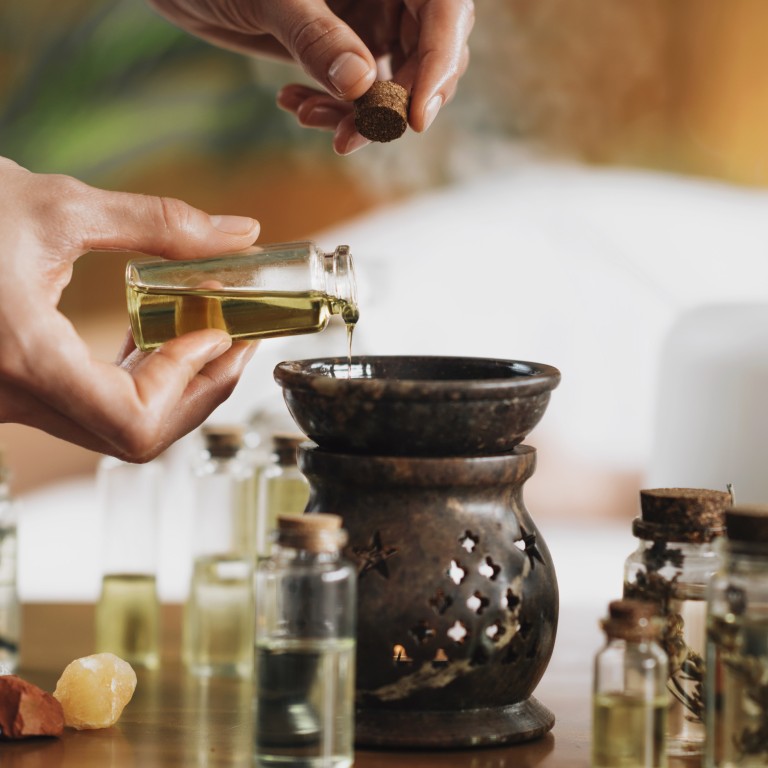Aromatherapy Massage
Aromatherapy uses a holistic approach that combines pleasant smelling essential oils with massage to bring about positive physical and psychological effects,

What is Aromatherapy Massage?
Aromatherapy means “treatment using scents”. It uses a holistic approach to care for the body using pleasant smelling essential oils, such as rose, lemon, lavender or peppermint. These oils are massaged into the skin, inhaled directly or diffused to scent an entire room.
An aromatherapist will take your medical history, emotional condition, general health and lifestyle into account before planning your course of treatment.
How Can it Help?
Massage with aromatherapy oils is a wonderfully relaxing and soothing experience. Depending on an individual’s needs, essential oils can be used to soothe, uplift, energise, relax or stimulate. Therapists are particularly sensitive to their clients’ need for modesty and the client is always covered with sheets or towels throughout the massage, which are removed only over the small portion of skin on which the therapist intends to work.
Treatment can range from a back massage to a full body.
If you need improvement in health problems from anxiety to poor sleep, you may want to consider aromatherapy. In this kind of treatment, you use extracts from plants called essential oils, by either breathing them through your nose or putting them on your skin. Some people put the oils on their skin when they get a massage or take a bath.
 What Are Essential Oils?
What Are Essential Oils?
Essential oils are made from flower, herb, and tree parts, like bark, roots, peels, and petals. The cells that give a plant its fragrant smell are its “essence.” When an essence is extracted from a plant, it becomes an essential oil.
It takes a lot of plant product to make essential oils. More than 200 pounds of lavender flowers are used to make just 1 pound of lavender essential oil.
Not all products made with plant essence are essential oils. True essential oils aren’t blended with other chemicals or fragrances. They’re made using a specific process that doesn’t change the chemistry of the plant.
Lemon, chamomile, lavender, cedarwood, and bergamot are a few of the essential oils used regularly in aromatherapy.How Aromatherapy Works
Experts think aromatherapy activates areas in your nose called smell receptors, which send messages through your nervous system to your brain.
The oils may activate certain areas of your brain, like your limbic system, which plays a role in your emotions. They could also have an impact on your hypothalamus, which may respond to the oil by creating feel-good brain chemicals like serotonin.
Some experts think that when you put essential oils on your skin, they cause a response in your skin and other parts of your body, like your joints.
What Is Aromatherapy Used For?
You shouldn’t use aromatherapy instead of your regular medical treatment. But for some conditions, research shows that aromatherapy can have health benefits. It may:
- Ease stress, anxiety, and depression
- Boost feelings of relaxation
- Improve sleep
- Help improve quality of life for people with long-term health problems like dementia
- Ease certain types of pain, including pain from kidney stones and osteoarthritis of the knee
- Fight bacteria when you put them on your skin
- Ease some of the side effects of cancer treatment, like nausea and pain
SUGGESTED:
Is It Safe?
Aromatherapy is generally safe. Essential oils can cause side effects, though. Some can irritate your eyes, skin, or mucous membranes in your nose. They can also cause mild allergic reactions.
If you drink some essential oils they can hurt your kidneys or liver. It’s rare that people take essential oils by mouth, and you shouldn’t do it unless your doctor says it’s OK.
If you’re new to aromatherapy, work with an aromatherapist or your doctor. And keep in mind that essential oils aren’t regulated by the FDA, which means that unlike drugs, the agency doesn’t check to see if they’re safe or work the way they’re supposed to.
